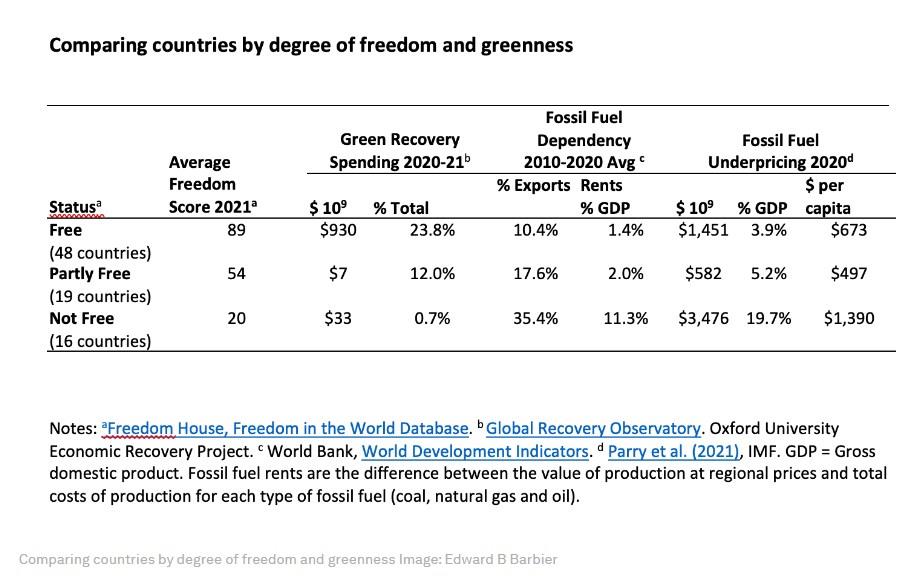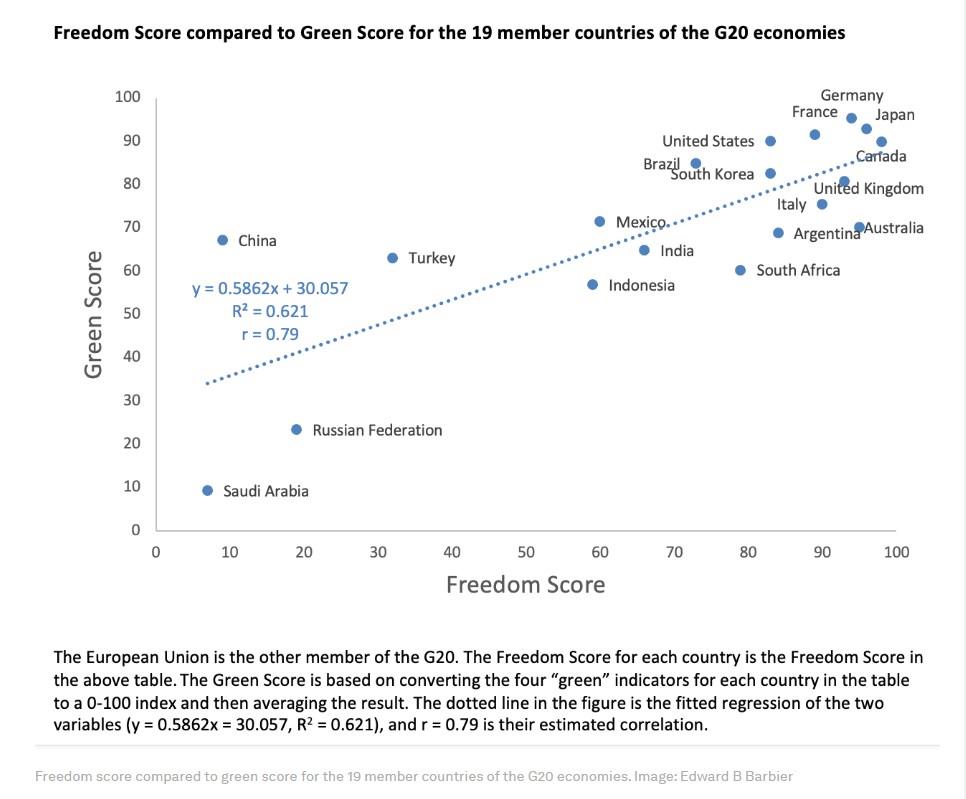by Edward B Barbier*
Two global crises have come to a head – climate change and the decline of democracy.
If global warming is to be kept below 1.5 oC, the world must act now to reduce carbon emissions. Achieving this objective requires substantially lowering fossil fuel use through a clean energy transition.
For the past 15 years, democracy has been in decline worldwide. To protect and promote freedom, leading democracies must strengthen their economies and safeguard liberty.
These two aims are not mutually exclusive but complementary. Reducing reliance on fossil fuels and transitioning to low-carbon alternatives also make democratic economies more sustainable. Major democracies should work together to achieve these two goals.
Democracy and greenness are linked
Evidence for 83 advanced, emerging market and developing countries indicates that in recent years democracies have been more willing to adopt green recovery policies, lessen fossil fuel dependency and reduce the underpricing of these fuels (see table).
Those countries that have made steps to green their economies in recent years are largely free and democratic, whereas those who have not are typically less free and more autocratic.

But it is among the world’s richest and largest economies – the Group of 20 (G20) – where the association between freedom and greenness is most striking (see figure). G20 countries with greater political rights and civil liberties tend also to have greener policies and economies. In comparison, countries that are less free are “browner”.
This relationship between democracy and greenness matters, as what happens in G20 economies has important implications for the future of the world economy, including curtailing climate change and other global environmental risks.
A clean energy transition led by major economies is essential for attaining net-zero carbon emissions by 2050, and any delay in progress over the coming years could make this target unattainable.
In addition, sacrificing further progress toward a low-carbon economy could put democracies in greater economic peril, not less. Russia’s invasion of Ukraine has brought renewed focus on this economic weakness.

A collective strategy for a green transition
For the US, the EU and other major democracies to reduce their economic vulnerability, they must act collectively to foster a green transition. Such a strategy should have three key elements.
First, leading democracies should agree to end the underpricing of fossil fuels, which is the principal factor preventing a clean energy transition. The underpricing associated with producing and burning coal, oil and gas amounted to $5.9 trillion in economic costs in 2020. Nearly a quarter of these losses – $1.45 trillion – occurred in 48 major and smaller democracies.
The leading democracies of the G20 should collectively commit to phasing out cost and tax breaks for the production and consumption of fossil fuels. They should also phase in more efficient pricing of fossil fuels through taxes or tradable permits to cover the costs of local air pollution, global warming, and other economic damages.
The G20 democracies should invite other major and smaller democracies to follow suit, with the aim of eventually encouraging all countries to adopt similar policies.
Second, to encourage compliance by other countries, G20 democracies should join the EU in adopting a carbon border adjustment mechanism (CBAM). A CBAM imposes a tax on carbon-intensive imports to reduce the risk of unfair competition for their domestic industries and to deter companies from relocating overseas to avoid compliance at home. It should also induce other economies to reform their underpricing of fossil fuels to avoid the penalties imposed by the policy.
Third, major democracies need to recycle the revenues saved or raised through reforming fossil fuel markets to fund additional green innovation, investments and protection. Support for green R&D is urgently needed in major democracies, as their economy-wide green innovation is falling well short of the level necessary to generate a transition from reliance on fossil fuels. Public investments should also target “smart” electrical grid transmission systems, charging station networks, and making cities more sustainable.
Finally, additional measures may be necessary to offset any adverse income or employment effects of a clean energy transition. This could include reducing payroll taxes, paying annual dividends, raising the minimum wage, compensating or retraining displaced workers, and allocating child tax credits to vulnerable households.
By delaying a clean energy transition, leading democracies are making their economies more vulnerable through continued reliance on fossil fuels. Collectively acting to foster a green transition is not only good for the climate but also critical for protecting democracy.
*University Distinguished Professor, Department of Economics, Colorado State University
**first published in: www.weforum.org




 By: N. Peter Kramer
By: N. Peter Kramer

